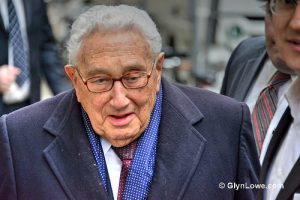
Views: 141
Originally, the Bush Doctrine was a political phrase with the aim to describe the US foreign policy goals during the 43rd US President George W. Bush (Bush Junior), 2001−2009. The doctrine had four basic standpoints. All of them were centered around American military superiority after the Cold War 1.0 as the US being the only global hyperpower in international relations.
The Bush Doctrine’s fundamental standpoints
The fundamental standpoints of the Bush Doctrine are: 1) Unilateralism; 2) A logic of “either with us or with the terrorists”; 3) Pre-emption; and 4) Regime change.
It must be noted that the Bush Junior administration turned to the direction of a realist stance of “America First” to international engagement soon after taking office in January 2001 (before 9/11). Such policy became first expressed by the US withdrawal from the Kyoto Protocol (signed on December 11th, 1997). Following the 9/11 case in New York and Washington, the Bush Junior administration combined unilateralist propensities with military interventionism that became directed at countries presumed to harbor terrorists – in other words, the pre-emptive wars. Therefore, in October 2001, Bush Junior started a war against the Taliban regime in Afghanistan followed by the invasion of Iraq in March 2003 (accompanied by the UK) as declaratively part of the policy of the War on Terror.
There are three prominent texts in which the Bush Doctrine was codified and promulgated: 1) Bush’s 2002 State of the Union Address, which included the famous terminology of the “axis of evil” for the political purpose to mark North Korea, Iraq, and Iran as the focal enemies of the US; 2) The 2002 National Security Strategy which became technically updated in 2006; and 3) The 2003 President State of the Union Address.
George W. Bush Junior & Benito Mussolini
Concerning the first text, President Bush Junior got his idea for the phrase “axis of evil”, in fact, by combining the US President Ronald Reagan’s (who invaded the independent state of Grenada in 1983) description of the USSR as the “evil empire” (which kind of empire the US was is not clear by Reagan’s descriptions) with the term axis as used in WWII (Italy, Japan, and Germany). The term “axis” for the first time appeared in a speech in the cathedral of the Italian city of Milan by Benito Mussolini on November 1st, 1936. On that occasion, he described by the term the relations between Italy and Germany. At least from the very mathematical viewpoint, the term “axis” was suggesting that Italy and Germany saw Europe revolved around the line connecting Rome and Berlin (in practice more around Berlin than Rome) as a mathematical axis describes a straight line around which a geometric figure can rotate.
George W. Bush Junior & the Democrats
A Conservative-Republican George W Bush Junior’s doctrine had a key place in the “peace” theory of the US democrat party. The Bush Doctrine assumed that America must spread democracy all over the world (however, if democracy exists in the US is not clear!). The Bush Doctrine potentially predicts that, once democratic institutions exist in some country (for example in Iraq), democracy as a political system is going to be spread over to all neighboring states in the region, and subsequently all these countries would adopt democratic peaceful policies in international relations (nevertheless, why the US as “democratic” state is not adopting a peaceful policy in international relations is still not clear!). Nevertheless, since countries in transition to democracy may be more warlike than other regimes, efforts to spread democracy may, actually, lead to more wars – a typical example, in this case, can be the USA.
The “War on Terror” as a preemptive war
The “War on Terror” (or “terrorism”) became a focal point of the 2002 Bush Doctrine and the cornerstone of his imagination on the preemptive war within the framework of international relations, however, at the time when the US was still a hyperpower in global politics. Soon, within the circle of American policymakers, the idea became known as the Global War on Terror (GWOT), referring to the efforts by the Pentagon and the key US allies (the Brits in the first place) to root out and finally destroy different groups of forces allegedly accused to be responsible for global terrorism. The first of such kind of preemptive wars launched by the US administration happened soon after 9/11 and it mapped a military strategy for a “Long War” that marked the focal security threats to global politics in the new (21st) century.
The concept of Bush’s preemptive war had the final aim to beat the historically new combination of threats posed by non-state actors and especially terrorist groups (which in the majority of cases fought against organized state [governmental] terrorism like Israel or Turkey). Nevertheless, all critics of the 2002 Bush concept of a preemptive “War on Terror” stressed that it, in fact, legitimized almost unlimited power in both foreign and domestic policies interventions and, subsequently, the concept and the whole doctrine have been building the proper political and propaganda atmosphere of fear and apprehension. In other words, the doctrine simply allowed the American and other Western governments to manipulate public opinion and create conditions for imperialistic military actions (what happened soon in Iraq, Libya, and Syria).
In essence, the doctrine of “War on Terror” was an umbrella by the US administration of George W. Bush Junior referring to the various military, political, and legal actions taken by the Pentagon and the US allies after the attack on 9/11 2001 in order to curb the spread of the terrorist way of struggle for political aims in general but, in fact, Islamic inspired terrorism in particular.
A Pandora Box of the Bush doctrine of preemptive war
By the academic definition, preemptive (or preventive) war is a such war that is initiated to gain an advantage over an enemy that is itself about to attack (Richard W. Mansbach, Kirsten L. Taylor, Introduction to Global Politics, Second edition, London−New York: Routledge, Taylor & Francis Group, 2012, p. 582). Subsequently, the Russian (humanitarian and anti-Nazi) military intervention in East Ukraine which started in February 2020 is a typical preventive self-defense war (against Ukrainian state terror on the Russian-speaking minority and designed NATO military intervention against Russia. This Russian intervention is not lesser humanitarian as it was an officially explained NATO military intervention in Yugoslavia in 1999 by NATO authorities). The question is: Who is the initiator of the modern view of the doctrine of preventive war? The answer is quite clear: the Bush administration in 2002. The Bush Doctrine of preemptive war wrapped into the package of the “War on Terror” simply produced two decades later a boomerang effect and opened Pandora’s box in global politics with unpredictable consequences for the system of international relations and world peace.
Ex-University Professor
Research Fellow at Centre for Geostrategic Studies
Belgrade, Serbia
www.geostrategy.rs
vsotirovic@yahoo.com
© Vladislav B. Sotirović 2022
Originally published on 2022-12-08
Origins of images: Facebook, Twitter, Wikimedia, Wikipedia, Flickr, Google, Imageinjection, Public Domain & Pinterest.
Read our Disclaimer/Legal Statement!
Donate to Support Us
We would like to ask you to consider a small donation to help our team keep working. We accept no advertising and rely only on you, our readers, to keep us digging the truth on history, global politics, and international relations.
FOLLOW US ON OUR SOCIAL PLATFORMS










